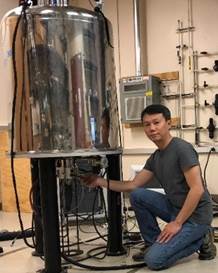At the invitation of Professor Cui Cui Mu from the School of Earth and Environmental Sciences at Lanzhou University, Professor Alex Chow from The Chinese University of Hong Kong will visit our campus and deliver an academic lecture on July 21, 2024. All faculty and students are welcome to attend!
Reporter: Professor Alex Chow, The Chinese University of Hong Kong
Title: Forests to Faucets: Protecting Drinking Water Quality at the Sources
Host: Professor Cui Cui Mu, School of Earth and Environmental Sciences, Lanzhou University
Time: Sunday, July 21, 2024, 10:30-12:00
Venue: Meeting Room 1615, Guanyun Building, Chengguan Campus, Lanzhou University

Reporter Profile:
Dr. Chow is currently a full professor of Earth and Environmental Sciences Program at the Chinese University of Hong Kong (CUHK). Prior to joining CUHK, he was a tenured full professor in the Department of Forestry and Environmental Conservation with a joint appointment in the Department of Environmental Engineering and Earth Science at Clemson University in South Carolina, USA. Dr. Chow obtained his BSc in Chemistry from the University of California, Berkeley, and MSc PhD in Hydrologic Science from the University of California, Davis. Dr. Chow have acquired over $7 million USD (> $50 million RMB) research grants from US federal agencies including National Science Foundation (NSF), Environmental Protection Agency (USEPA), Department of Energy (DOE), and National Institute of Food and Agriculture (NIFA). Dr. Chow is the technical editor of the Journal of Environmental Quality and an associate editor of Water Research X. He also served as an associate editor of Soil Science Society of America Journal for 6 years. Prof. Chow also served on NSF, DOE, and NIFA proposal review panels. Prof. Chow is an expert in carbon and watershed biogeochemistry and his research focuses on watershed disturbance such as wildfire, hurricane, forest management, and land use changes on soil and water quality.
ReporteProfile:
Climate change has led to more frequent and extreme weather events and disasters, such as hurricanes, wildfires, and sea level rise. These natural disasters pose press and pulse disturbances and significantly alter the landscapes and structures of ecosystems, resulting changes in quantities and compositions of dissolved organic carbon (DOC). DOC is ubiquitous in soils, waters, and sediments, controlling many physical, biological, and chemical processes as well as determining the fates of micropollutants and carbon sequestration in natural, agricultural, and engineering systems. Understanding the water quality, particularly DOC, from different sources and under extreme weather conditions could help for sustainable and resilient designs and water resource management. This presentation will show the consequences of two types of natural hazards due to climate changes on drinking water safety. Specifically, the temporal variations of dissolved organic matter (DOM) and disinfection byproduct (DBP) precursors from natural forested watersheds were examined after wildfires in California and hurricanes in South Carolina, USA. Results of these studies illustrate chemical characteristics and dynamics of water quality after natural hazards. Proactive management and alternative treatment options are needed to sustain safe drinking water supply under the changing climate.
School of Earth and Environmental Sciences, Lanzhou University
July 20, 2024